Hermas is a masculine given name. Notable people with the name include:
It is also a plant genus:
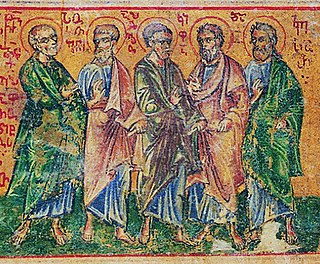
Apollos was a 1st-century Alexandrian Jewish Christian mentioned several times in the New Testament. A contemporary and colleague of Paul the Apostle, he played an important role in the early development of the churches of Ephesus and Corinth.
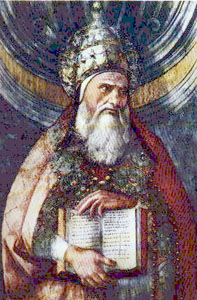
Pope Pius I was the bishop of Rome from c. 140 to his death c. 154, according to the Annuario Pontificio. His dates are listed as 142 or 146 to 157 or 161, respectively. He is considered to have opposed both the Valentinians and Gnostics during his papacy. He is considered a saint by the Catholic Church and the Eastern Orthodox Church with a feast day in 11 July, but it is unclear if he died as a martyr.

Pentecost is a Christian holiday which takes place on the 50th day after Easter Sunday. It commemorates the descent of the Holy Spirit upon the Apostles and other followers of Jesus Christ while they were in Jerusalem celebrating the Feast of Weeks, as described in the Acts of the Apostles.

Agabus was an early follower of Christianity mentioned in the Acts of the Apostles as a prophet. He is traditionally remembered as one of the Seventy Disciples described in Luke 10:1–24.
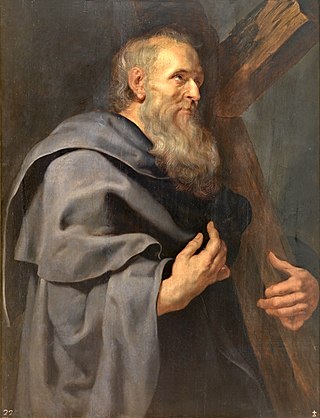
Philip the Apostle was one of the Twelve Apostles of Jesus according to the New Testament. Later Christian traditions describe Philip as the apostle who preached in Greece, Syria, and Phrygia.

Silas or Silvanus was a leading member of the Early Christian community, who accompanied Paul the Apostle on his second missionary journey.

The Shepherd of Hermas, sometimes just called The Shepherd, is a Christian literary work of the late first half of the second century, considered a valuable book by many Christians, and considered canonical scripture by some of the early Church fathers such as Irenaeus. The Shepherd was very popular amongst Christians in the 2nd, 3rd, and 4th centuries. It is found in the Codex Sinaiticus.

Saint Martial, called "the Apostle of the Gauls" or "the Apostle of Aquitaine", was the first bishop of Limoges. His feast day is 30 June.

Archippus was an early Christian believer mentioned briefly in the New Testament epistles of Philemon and Colossians.
Silvanus or Sylvanus may refer to:
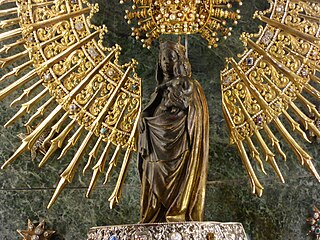
Our Lady of the Pillar is the name given to the Blessed Virgin Mary in the context of the traditional belief that Mary, while living in Jerusalem, supernaturally appeared to the Apostle James the Greater in AD 40 while he was preaching in what is now Spain. Those who adhere to this belief consider this appearance to be the only recorded instance of Mary exhibiting the mystical phenomenon of bilocation. Among Catholics, it is also considered the first Marian apparition, and unique because it happened while Mary was still living on Earth.

The seventy disciples or seventy-two disciples, known in the Eastern Christian traditions as the seventy apostles or seventy-twoapostles, were early emissaries of Jesus mentioned in the Gospel of Luke. The correct Greek terminology is evdomikonta (εβδομήκοντα) apostoli or evdomikonta mathetes.

May 30 - Eastern Orthodox Church calendar - June 1
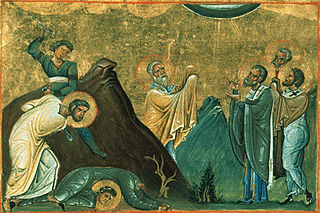
Quartus was an early Christian who is mentioned in the Bible.
Achaicus was a Corinthian Christian who according to the Bible, together with Fortunatus and Stephanas, carried a letter from the Corinthians to St. Paul, and from St. Paul to the Corinthians.

Aristobulus of Britannia is a Christian saint named by Hippolytus of Rome (170–235) and Dorotheus of Gaza (505–565) as one of the Seventy Disciples mentioned in Luke 10:1–24 and as the first bishop in Roman Britain.

Saint Hermas of Philippopolis was one of the Seventy Disciples and was bishop in Philippopolis in Thrace. Hermas, the author of The Shepherd of Hermas, was often identified with him, but that Hermas was a second-generation Christian and lived some time after this Hermas. He is mentioned in Romans 16:14, and his feast day is celebrated on May 31, on November 5 with Apostles Patrobas, Linus, Gaius, and Philologus, and on January 4 among the Seventy.
Hermes of Dalmatia is numbered among the Seventy Disciples. He was bishop in Dalmatia.
Saint Euprepius of Verona, is venerated as the first bishop of Verona. Not much is known of his life beyond the fact that his name was Greek, which is considered evidence of the antiquity of the Veronese see.

An apostle, in its literal sense, is an emissary, from Ancient Greek ἀπόστολος (apóstolos), literally "one who is sent off", from the verb ἀποστέλλειν (apostéllein), "to send off". The purpose of such sending off is usually to convey a message, and thus "messenger" is a common alternative translation; other common translations include "ambassador" and "envoy". The term in Ancient Greek also has other related meanings.